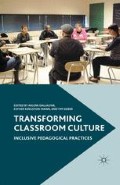Abstract
The course is Female Crime and Deviance. Thirty students, more or less, sit up or slouch on black, plastic desk-chair combos, an utterly generic university scene on an utterly typical mid-semester afternoon. Some talk quietly, some bolt a sandwich or chips, and some check their cell phones or finish a text message. As I enter the room, most put away what they are doing and shift into class mode. They are respectful, mostly, patient, ready for the lesson. The lesson I have prepared for them is this: to embark on a six-week project that will push each to embrace and explore an alternative identity associated with a communal social concern, and, in small groups, to merge these constructed identities into teams of collaborators who will research and design organized and detailed responses to social problems. They will prepare testimonies to convince a mock legislative committee to fund their inventions. They will take on problems of mental illness, of family and community violence, of reintegration following incarceration, and of health care, education, training, and employment. Bearing their adopted personas of constructed histories and challenges, they place themselves in others’ shoes, walk a mile, and work to understand, from the inside out, some of what social policy means and does. And in these mock enactments, as students create and advocate social welfare policies and services, they enter the worlds and identities of their imagined alters: contrived at first, perhaps, but nearly always genuine and internalized in the end. In so doing, they grow in compassion and empathy.
Genuine communication involves contagion; its name should not be taken in vain by terming communication that which produces no community of thought and purpose between the child and the race of which he is the heir.
(Dewey 1991/1920, 224)
The basic categories of human mental life can be understood as products of social history—they are subject to change when the basic forms of social practice are altered and thus are social in nature.
(Luria 1976, 164)
My name is Jane ___ and I am a social worker in a limited community center, focused quite specifically on helping mostly post-incarcerated women. We provide wraparound services in a unique program that unites post-incarcerated mothers with their children immediately upon release, rather than make them “earn” their children back. We have had flexible seed money that so far, in a pilot program, has reunited families and led to more stable living and employment situations more quickly, and provided services to reduce everyday Stressors for mothers and children, and to increase nutrition, sleep, and everyday health. We now seek funds to expand this program in the region. Please refer to the briefing memo I have distributed, and allow me to explain.
University of Massachusetts Dartmouth student, Mock testimony of an imagined program for the course Female Crime and Deviance.
Access this chapter
Tax calculation will be finalised at checkout
Purchases are for personal use only
Preview
Unable to display preview. Download preview PDF.
Notes
See, for example, Nancy Lee Hall’s A True Story of a Drunken Mother (1990) and A True Story of a Single Mother (1994).
For example, I assign Anna Quindlen’s (2000) novel of domestic violence and escape, Black and Blue, and Margaret Atwood’s (1998) speculative novel of militaristic control of women’s bodies, The Handmaid’s Tale, among others.
Editor information
Copyright information
© 2011 Arlene Dallalfar, Esther Kingston-Mann, and Tim Sieber
About this chapter
Cite this chapter
Robinson, R.A. (2011). The Whole Person in Front of Me: Toward a Pedagogy of Empathy and Compassion. In: Dallalfar, A., Kingston-Mann, E., Sieber, T. (eds) Transforming Classroom Culture. Palgrave Macmillan, New York. https://doi.org/10.1057/9780230370319_9
Download citation
DOI: https://doi.org/10.1057/9780230370319_9
Publisher Name: Palgrave Macmillan, New York
Print ISBN: 978-1-137-57568-5
Online ISBN: 978-0-230-37031-9
eBook Packages: Palgrave Education CollectionEducation (R0)

